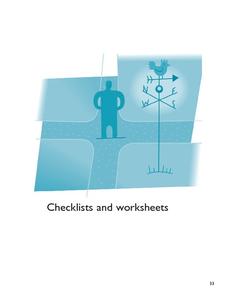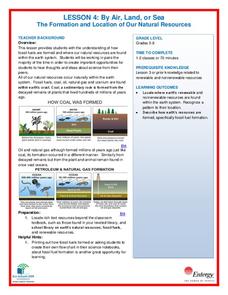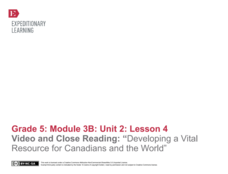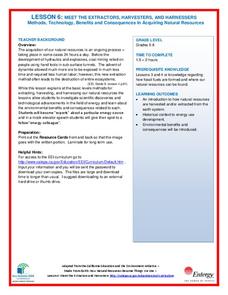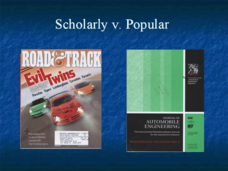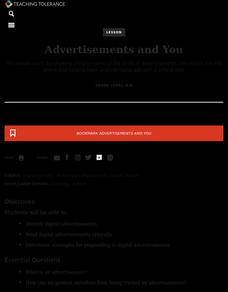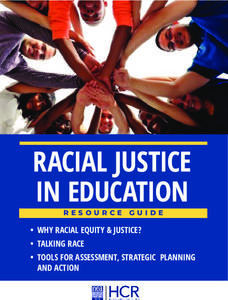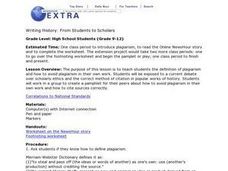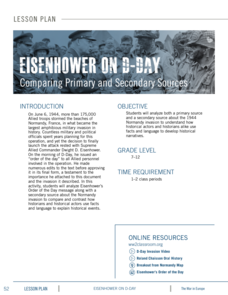Cal Recycle
Conserving Natural Resources
Trying to plan an engaging elementary science unit on natural resources? Conserve your energy! This five-part series of lessons and hands-on activities has exactly what you need to teach young scholars about the importance of conservation.
Education World
Edible Resource Maps!
Young scholars discuss resource maps and examine examples from library resources. Working in groups, they create edible resource maps by drawing examples, such as popcorn on the border of Iowa and Nebraska. Then they use cookies in the...
Vermont Student Assistance Corporation
College Admissions Toolkit: College Planning Tools and Resources
Everything scholars need to know about the college search process is included in a 15-page College Admissions Toolkit. Scholars begin their search by considering the type of post-secondary program they want, what they want to learn, and...
National Wildlife Federation
By Air, Land, or Sea: The Formation and Location of Our Natural Resources
Coal forms from the ancient remains of plants that were alive on Earth before the dinosaurs! Scholars use their t-charts from the previous lesson over resources and research to determine if their information is correct. Through analysis...
EngageNY
Video and Close Reading: “Developing a Vital Resource for Canadians and the World”
Scholars watch Developing a Vital Resource for Canadians and the World to learn about the supplement potash that helps plants grow. They watch the video several times, completing a note catcher to record key ideas along the way. Pupils...
American Chemical Society
Natural Resources and Synthetic Materials
All synthetic materials began as natural materials. An engaging lesson begins with a hands-on activity and an example of the type of research that scholars perform independently. Then pupils receive a topic and begin researching the...
EngageNY
Research Skills, Part 1: Natural Resource Development and How it Modifies the Physical Environment
Put it in your own words. Scholars complete a mini instructional activity about paraphrasing then complete a note catcher using the text A Limited Supply. They continue studying Canada's natural resources by analyzing the graph...
EngageNY
Research Skills, Part 2: Natural Resource Development and How It Modifies the Physical Environment
Name your source. Scholars receive research folders with articles of information about natural resources. They use the sources to conduct research to answer questions about how Canada's environment meets the needs of the people and how...
National Wildlife Federation
Meet the Extractors, Harvesters, and Harnessers: Methods, Technology, Benefits and Consequences in Acquiring Natural Resources
There are advantages and disadvantages to all sources of energy; the trick is determining which one has the least impact! Part six in the series of 12 has learners further explore energy resources. After reading information about one of...
Curated OER
Scholarly v. Popular (Journals)
How do you determine whether a resource is credible or not? Contrary to what your class probably believes, just because it's published doesn't mean it provides accurate information! So how does one determine if it's credible? Use this...
Science Matters
Renewable and Nonrenewable Resources
Did you know there are at least 12 different energy sources? Scholars apply their knowledge about the different types of energy as they sort energy sources by renewable and nonrenewable. Then they pick one from each section to explain in...
Collier County Public Schools
Women’s History Month Resource Packet
The women's suffrage movement changed the lives of future. Scholars complete hands-on activities, group discussions, posters, and conduct research to understand the importance of the push for women's right to vote. The resource packet...
EngageNY
Resource Materials and Gathering Information: Reading Another “Choice” Text from the Research Folder
Look it up. Scholars use a dictionary and thesaurus to verify the meaning of the research vocabulary words they defined in the previous activity. They then use sticky notes to write a synonym for each word. Finally, individuals choose a...
Teaching Tolerance
Advertisements and You
Watch out for clever advertisements! Using the lesson, scholars learn how to identify online ads and respond to them critically. They then use what they've learned to develop a list of strategies to evaluate web pages.
National Wildlife Federation
An Energy Mix: Renewable and Nonrenewable Resources
What did the windmill say about renewable energy? I'm a BIG fan! Lesson three in the series of 12 has classes discuss potential and kinetic energy and then, in pairs, they complete a web quest over the different types of energy...
National Education Association
Racial Justice in Education Resource Guide
Strive for racial justice within your classroom community with help from an 80-page resource guide. Five modules move scholars through thoughtful, and reflective grand conversations to making a plan, then taking action. Learners write...
Curated OER
Writing History: From Students to Scholars
An Online NewsHour article about scholarly ethics launches this study of plagiarism. Since historians are supposed to bring original ideas and perspectives to their publications, they must give credit to the ideas of others. After a...
K-State Research and Extensions
Water
How are maps like fish? They both have scales. The chapter includes six different activities at three different levels. Scholars complete activities using natural resources, learn how to read a map, see how to make a compass rosette,...
Benjamin Franklin Tercentenary
Franklin’s Philadelphia: Another Point of View
While Benjamin Franklin enjoyed fame and success in colonial Philadelphia, that was not the experience of all coming to the British colonies. Young scholars trace the life of an indentured servant using a scholarly biography and reading...
National WWII Museum
Eisenhower on D-Day: Comparing Primary and Secondary Sources
Dwight D. Eisenhower's message to troops for D-Day is iconic. Individuals examine Eisenhower's words and compare that to historians' understanding of the epic events of that day using primary sources, an essay, and a Venn diagram to...
University of Minnesota
Homeostasis of Thermoregulation
Whether you're battling the flu or trying to warm up on a chilly day, your body's ability to react to temperature change is fascinating! Anatomy scholars discover the fantastic feedback loops that control body temperature in a rigorous...
Judicial Learning Center
Your Day in Court: Criminal Justice
When a person goes on trial for a crime, what options does a court have to render justice? Who are the key players in the legal system? Interested legal scholars answer the inquiries and more using an Internet-based activity, chart, and...
College Board
2003 AP® Microeconomics Free-Response Questions Form B
How are monopolies and competitive firms similar and different? Scholars consider the question using authentic College Board materials. Other prompts consider supply and demand curves and the relationship between wages and output.
Pittsburgh Ballet Theatre
Peter Pan: Teacher Resource Guide
What are some of the pros and cons of staying young forever? With the Peter Pan resource, learners discover the magical world of Neverland. Scholars create advertisements that promote eternal youth, and then write persuasive pitches for...




